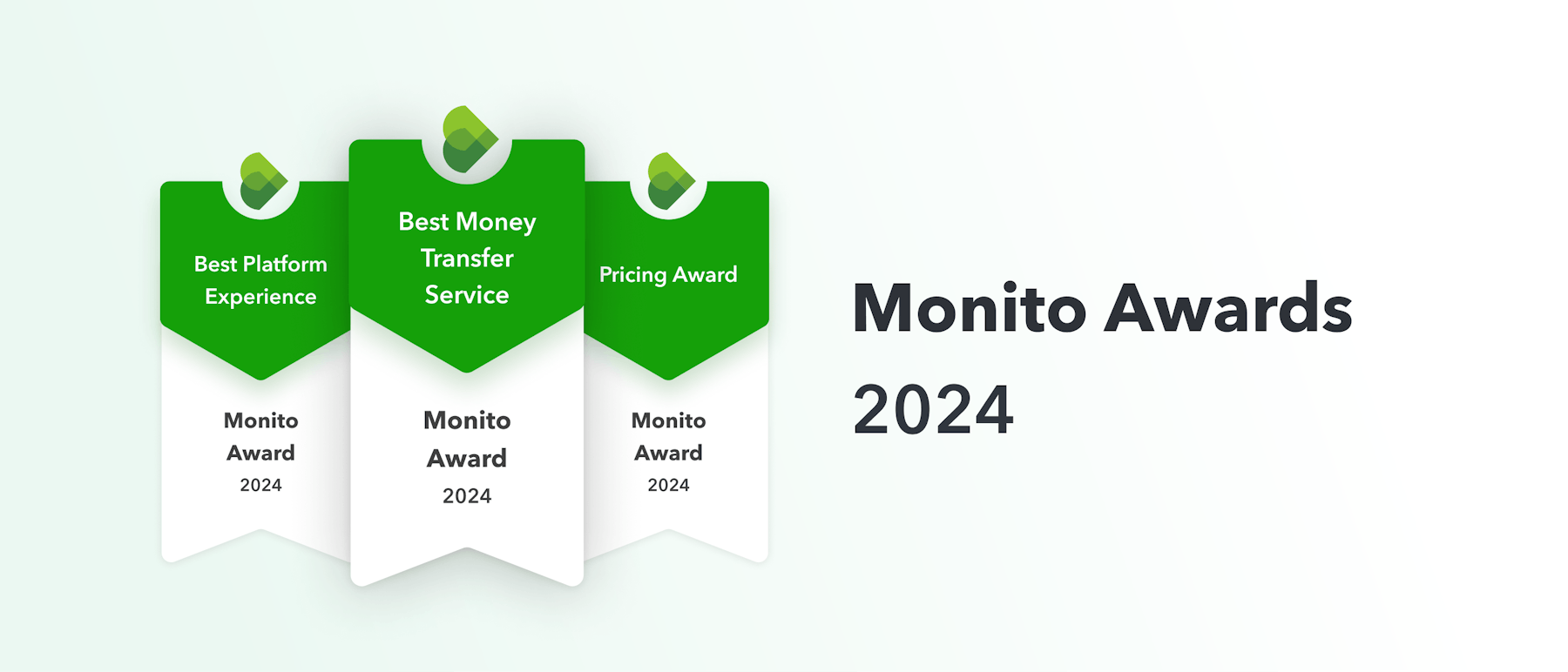
International Bank Transfers
![]()
Live Comparison
Find the cheapest way to send money abroad.
![]()
Banks by Country
Compare bank fees by country.
![]()
Exchange Rates
Follow exchange rates over time.
![]()
Wire Transfers
Learn about international wire transfers.
![]()
Digital Platforms
See better alternatives to banks for transfers.
![]()
Security
Learn about making safe international transfers.
International Bank Transfers: Fees, Exchange Rates, and Alternatives
Banks are a fundamental part of modern life. In the twenty-first century, more people than ever before have access to their own bank accounts, which they rely on for managing their day-to-day finances such as making and receiving payments, saving money, and even loans.
It's therefore understandable the bank may seem like the logical place to go when sending money internationally. However — while most banks offer international transfers to customers — bank charges for sending money abroad tend to be pricey (often exorbitantly so). Ultimately, due to the multitude of wire transfer fees involved, this leaves the bank seldom the cheapest option to send money abroad. This is exactly why we recommend low-cost, savvy online providers like Remitly to send money internationally instead of going through the bank.
This guide explores the typical bank charges to send money abroad before comparing the cheapest alternatives. Then, we go through the top tips for saving when sending money abroad to help you minimise the costs of your next transfer.
Banks are expensive for international transfers. Find a better deal now:
International Bank Transfer Fees
- 01. How do international bank transfers work?
- 02. How much do international bank transfers cost?
- 03. What extra costs do banks charge for sending money abroad?
- 04. What are the best banks for international wire transfers?
- 05. What are the best bank alternatives?
- 06. How can I cut wire transfer fees?
- 07. FAQ about international bank transfer fees
How To Make an International Bank Transfer
Before we delve into bank charges to send money abroad, let's examine the types of services banks offer for international transfers.
When sending money, practically all banks allow customers to send everyday bank transfers within the same country and currency. This is done via country-specific clearinghouses or interbank networks (e.g. via ACH in the US, CHAPS in the UK, Interac in Canada, etc.).
For international payments, on the other hand, things work slightly differently. These involve a different service, international wire transfers — the delivery of funds from one currency to another via SWIFT. These transfers take longer and involve several bank charges (which we'll explore later), generally making them less fast, cheap, and convenient to customers than domestic transfers.
Making an international bank transfer is a simple and secure process for most banks. It can be done by visiting your bank's website or mobile app to verify what information you'll need from your beneficiary to process a bank wire. These generally include most or all of the following pieces of information:
- The beneficiary’s full name;
- The beneficiary's postal address;
- The beneficiary's account number;
- The beneficiary bank's branch number and full address;
- A SWIFT, BIC, or IBAN.
With these details at the ready, you'll be able to log in to your online banking portal and instruct an international wire transfer directly from there. Alternatively, you can also visit your bank branch to send a bank wire, although this service tends to come at a steeper price.
To learn more about how to make a bank wire transfer, take a look at Monito's guide here.
International Bank Transfer Fees
One of the significant drawbacks of making an overseas bank transfer is the costs involved. While precise fees vary from bank to bank, two types of costs are applied: wire transfer fees (which can include correspondent and intermediary bank fees, as we'll explore later) and exchange rates.
International Bank Conversion Fees
Because the sending bank imposes wire transfer fees, bank charges for sending money abroad vary significantly not only from bank to bank but also from country to country:
US banks, for example, tend to charge a single, fixed fee for international bank wires that usually falls between USD 25 to USD 45 per transfer. In Canada, transfer fees vary dramatically (generally falling between CAD 5 and CAD 30 or higher per transfer) and tend to be steeper the more one wires.
In the UK, high-street banks often advertise themselves as being "fee-free" for international wire transfers, although it's quite common for them to charge up to GBP 20 for transfers to certain countries. Across the globe in Australia, these fees range between AUD 6 and AUD 30, while neighbouring New Zealand bank charges for sending money abroad hover between NZD 10 and NZD 20 per transfer.
In South Africa, international bank transfers involve a commission of around 0.5% of the transfer value (with minimum and maximum caps) and a fixed fee, usually between ZAR 100 to ZAR 200 per transaction. Similarly, most Singaporean banks also charge a commission for telegraphic transfers (usually in the region of 0.125% of the transfer value) in addition to a fixed fee of SGD 20 to SGD 30 per transfer.
International Bank Exchange Rates
Bank charges for sending money abroad also involve another major cost: the exchange rate margin. This cost is the difference between the mid-market exchange rate and the exchange rate offered to consumers. It is charged by practically every bank around the globe, even if it's not displayed transparently.
Exchange rate margins fluctuate continually and follow broader dynamics in the foreign exchange market, making them hard to pin down. However, for most banks, exchange rate margins tend to range from as low as 1.5% of the transfer value to as high as 15% or more at the extremes. (It's worth noting that exchange rate margins tend to be lower for transfers to major world currencies and higher for transfers to more obscure or volatile ones.)
Exchange rates are often levied proportionally to transaction fees to account for the total cost of making an international wire transfer. For example, UK banks tend to charge most (usually all) of their fees as exchange rate margins, and as a result, their margins are high (often around 8% to 10%) while their transfer fees are low or nonexistent. On the other hand, Singaporean banks tend to levy a bulk of their international transfer fees in fixed and commission fees, resulting in higher fees and lower exchange rate margins. US and Australian banks tend to be somewhere in the middle.
International Transfers With Other Banks
United States
United Kingdom
High-Street Banks
Indian Banks
Other Multinational Banks
Ireland
Bank Charges for Receiving Money From Abroad
In addition to fees for sending money abroad, many banks also charge a separate set of fees for receiving money from overseas. These can either be charged as one or both of the following:
- Transaction fee: A fixed or commission fee levied per wire transfer received into an account. The amount is typically debited automatically in the receiving currency (e.g. Barclays in the UK charges a GBP6 fixed fee per transfer received from outside SEPA).
- FX margin: If the amount sent isn't exchanged by the sender and arrives into the receiver's account in a foreign currency, the receiver's bank will exchange the funds at an exchange rate that's poorer than the mid-market rate.
What Extra Costs Do Banks Charge for Sending Money Internationally?
Unfortunately for senders, there are many bank charges for sending money abroad — many of which go beyond the standard fees and exchange rates we explored above. These include the following:
Correspondent Bank Fees
A notorious fee in the world of international banking, the correspondent bank fee comes into the picture when banks don't have the networks or resources to conduct financial transactions directly to all other banks across the world. In these cases, they use another type of financial institution, known as a correspondent bank, to get the job done.
Avoid 'OUR' payments. If you're asked to choose between 'SHA,' 'BEN,' and 'OUR,' we recommend you avoid choosing 'OUR' payments wherever possible. These instructions can open the door to third-party banks levying further fees from you long after the transfer has been sent.
Correspondent bank fees are not universal, meaning not every overseas transfer you make will incur one. However, when they do come into the picture, they tend to be quite expensive, usually in the range of USD 10 to USD 100 per transfer (or currency equivalent).
Other Service Fees
Banks commonly also charge additional fees when customers wish to instruct wire transfers in-branch or over the telephone. These usually come in the form of higher fixed fees, making bank charges for sending money abroad significantly more expensive, especially for smaller transfer amounts.
Best Banks for International Wires
The best banks for international wire transfers depend largely on your country and, to a lesser degree, the country you'd like to send money to. In general, however, the best banks for sending international wire transfers by country are the following:
- The US: Citibank
- The UK: Bank of Scotland, or its subsidiary Halifax
- Australia: NAB
- Canada: Scotiabank
- New Zealand: Kiwibank
- Singapore: DBS (especially its remittance service DBS Remit), or its subsidiary POSB
- South Africa: Absa
Cheaper Alternative for Money Wire Transfers
Due to the high bank charges for sending money abroad, Monito's experts tend to recommend against using banks to send money internationally, especially for people who'd like to save money on every transfer. (For people who feel safe with their bank and don't mind paying extra fees, sticking with the bank is probably the best bet).
Instead of using the bank, we recommend comparing money transfer specialist services to get the job done quicker and more cheaply. While you won't be able to dodge wire transfer fees entirely, you will be able to take advantage of faster payments and lower costs in general. Take a look at Monito's in-depth guide to learn more about the difference between money transfer specialists and banks for overseas payments.
To get a sense of how the top money transfer services on Monito compare to banks, take a look at Wise, Remitly, and Paysend below:
1 — Wise
London-based fintech Wise is a world-class option for sending money internationally and frequently ranks as the cheapest way to transfer money internationally on Monito. According to the Monito Score, Wise is also ranked as the best money transfer service of all, and its mobile app is ranked the best money transfer app.
Cost: Wise charges a mix of fixed fees and commissions for different corridors, which usually constitute between 0.25% and 1.00% of the total transfer value. Wise was the cheapest service on 21% of global comparisons on Monito between July 2020 and 2021.
Coverage: Available in the EEA, UK, US, Singapore, Japan, Australia, and New Zealand, Wise supports transfers to around 57 foreign currencies across the globe.
Recommendation: We recommend Wise, especially for small- to medium-sized bank transfers (up to USD 10,000) destined for international bank accounts, as the platform is particularly well-priced for these transfers.
Best for: International transfers to a bank account.
More info: See our full Wise review or visit their website.
2 — Remitly
Remitly is a US-based digital remittance service that's frequently the fastest and cheapest way to send money internationally on Monito. The platform offers various pay-in and pay-out options (including card payments, bank transfers, and cash services) and supports money transfers to over 85 countries worldwide.
Cost: Remitly's fees are built into the exchange rate and typically range between 0.50% and 2.00% of the international money transfer value, depending on the currencies in question. Remitly was the cheapest service on 20% of global comparisons on Monito between July 2020 and 2021.
Coverage: Available in Europe, North America, Singapore, and Australia, Remitly supports transfers to around 47 currencies on every continent.
Recommendation: Because of its speed and pricing for cash-related transfers in particular, we recommend Remitly for sending money for cash pick-up and cash home delivery services.
Best for: Transfers for cash pick-up.
More info: See our full Remitly review or visit the website.
3 — Paysend
A true specialist in international card payments, Paysend is a flexible and fast-growing money transfer platform that supports credit and debit card payments to an impressive network of nearly 100 receiving countries through various pay-out options.
Cost: Paysend charges a fixed fee for most card-to-card and card-to-Paysend-wallet transfers and an exchange rate margin of between 0.50% and 2.00% of the international money transfer value. Paysend was the cheapest service on roughly 25% of global comparisons on Monito in May 2021.
Coverage: Paysend is available to residents of 49 countries and supports transfers to 90 countries across the globe.
Recommendation: We recommend Paysend for international card payments to credit cards, debit cards, or bank accounts due to its excellent fees and exchange rates for these types of transfers.
Best for: International card transfers.
More info: See our full Paysend review or visit the website.
How To Save Money On International Bank Transfers
While you won't be able to avoid costs entirely, there are still several tricks to avoid bank charges for sending money abroad and minimise your costs by finding the cheapest way to send money internationally. These include the following:
- Open a bank account that doesn't charge additional fees for international money transfers;
- Avoid credit or debit cards to fund your money transfer;
- Avoid high-street banks and PayPal, which are practically never the cheapest way to transfer money internationally;
- Send money to a bank account or mobile wallet rather than a cash pick-up location;
- If exchanging money for physical cash banknotes, avoid bureaux de change and banks;
- Choose a longer transfer speed when it reduces overall fees.
Read to learn more about how to send money internationally.
To simplify your research, Monito has reviewed and compared hundreds of money transfer services and bank charges to send money abroad. You can compare them all in real-time using our award-winning comparison engine below —
Banks are pricey. Compare alternatives to send money abroad:
FAQ About International Bank Transfer Fees
💰 Why are wire transfer fees so high?
Wire transfer fees tend to be high largely because of the costs associated with sending money over the SWIFT. Moving money via SWIFT often involves many steps and expenses for banks, most of which are passed along to the customer sending the money in the form of fees and exchange rates. In addition, third-party banks also frequently deduct fees directly from funds moving along the wire, often without the full knowledge of the sender. In the end, the leaves wire transfer fees very high for customers.
💵 What are wire transfer fees?
For wire transfer fees sent from US accounts, fixed fees are around US$25.00 to US$40.00 per transfer. In Canada, they are between C$3.00 and C$30.00.
🧾 Are wire transfer fees tax deductible?
If you're an ordinary consumer sending money abroad or if you're sending remittances from one country to another, you generally won't be subject to any tax on your international transfers. Taxation generally is only applicable to businesses seeking to import goods from overseas.
🌍 What are UK bank charges for sending money abroad?
UK bank charges for sending money abroad vary from bank to bank, generally ranging between £0.00 and £20.00 per transfer. In addition, UK banks charge exchange rate margins in the region of 5.00% to 10.00% (and even higher).
🏦 How much are wire transfer fees for Chase?
If you're sending money to an overseas bank account in a foreign currency with Chase, you won't be charged a wire transfer fee for amounts sent less than US$5,000.00. For amounts greater than US$5,000.00, you'll be charged a US$5.00 flat fee.
🚫 Can wire transfer fees be waived?
Yes, bank wire transfer fees are sometimes waived for new users or under certain promotional deals. However, this is not the norm, and bank wire transfers always come at a cost. Take a look at Monito's guide on free international money transfers to find out why.
🏛 Do all banks charge wire transfer fees?
Yes, for all intents and purposes, all banks charge wire transfer fees in one form or another, and bank wire transfers will always come at a cost. Take a look at Monito's guide on free international money transfers to find out why.
💸 How can I avoid wire transfer fees?
While it's not possible to avoid wire transfer fees altogether, you can minimise your costs and find the cheapest way to send money internationally by doing the following:
- Opening a bank account that doesn't charge additional fees for international money transfers;
- Avoiding credit or debit cards to fund your money transfer;
- Avoiding high-street banks and PayPal, which are practically never the cheapest way to transfer money internationally;
- Sending money to a bank account or mobile wallet rather than a cash pick-up location;
- Choosing a longer transfer speed when it reduces overall fees.
🔢 How do I calculate wire transfer fees?
Use Monito's real-time comparison engine to break down bank charges for sending money abroad and compare them to the top international money transfer specialists. With Monito, you'll be able to get a full and transparent overview of the total costs (including fees, exchange rate margins, and correspondent bank fees) associated with any transfer.
👥 Who should pay wire transfer fees?
When sending money internationally, customers are frequently asked to choose who will pay wire transfer fees: the sender ('OUR'), the beneficiary ('BEN'), or both ('SHA'). However, because international wire transfers open the door to correspondent bank fees, which can be as high as US$100.00 per transfer (or currency equivalent), if you're asked to choose between 'SHA,' 'BEN,' and 'OUR,' we recommend you avoid choosing 'OUR' payments wherever possible. These instructions can open the door to third-party banks levying further fees from you long after the transfer has been sent.
🐦 Does Starling Bank charge to send money abroad?
Yes, Starling Bank does charge to send money abroad. However, these fees tend to be very low compared to high-street banks and competitive even against money transfer specialists such as Wise. This is because Starling Bank charges the mid-market exchange rate and a low fixed fee of around 0.4% of the transfer value. Take a look at Monito's in-depth Starling Bank review to find out more.
📥 Do banks charge for receiving money from abroad?
Yes, most bank charge for receiving money from abroad. These can either be charged as one or both of the following:
- Transaction fee: A fixed or commission fee levied per wire transfer received into an account. The amount is typically debited automatically in the receiving currency (e.g. Barclays in the UK charges a £6.00 fixed fee per transfer received from outside SEPA).
- Exchange rate margin: If the amount sent isn't exchanged by the sender and arrives into the receiver's account in a foreign currency, the receiver's bank will exchange the funds at an exchange rate that's poorer than the mid-market rate.
See Monito's In-Depth Money Transfer Guides
Why Trust Monito?
You’re probably all too familiar with the often outrageous cost of sending money abroad. After facing this frustration themselves back in 2013, co-founders François, Laurent, and Pascal launched a real-time comparison engine to compare the best money transfer services across the globe. Today, Monito’s award-winning comparisons, reviews, and guides are trusted by around 8 million people each year and our recommendations are backed by millions of pricing data points and dozens of expert tests — all allowing you to make the savviest decisions with confidence.
Monito is trusted by 15+ million users across the globe.
Monito's experts spend hours researching and testing services so that you don't have to.
Our recommendations are always unbiased and independent.












